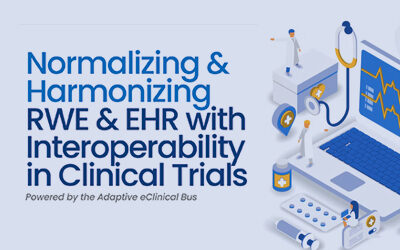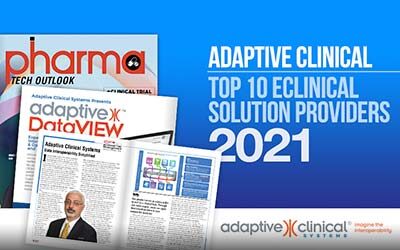DIA 2024-Our Take
Focusing on Data, Tech, AI, and Innovation

Hosted in San Diego, the DIA Global Annual Meeting celebrated 60 years of innovation. The event was well attended and provided an excellent forum for networking and discussing the challenges to innovation. This year, Adaptive Clinical’s Sina Adibi and Mitch Collins were selected to provide a short course as a part of the event. Our session, A Guide to Plan and Implement a Clinical Research Data Integration Hub, reflected the conference’s themes in the Data and Technology track. Better data management and data aggregation innovations continue to drive change at the forefront for clinical trial research.
The Adaptive Clinical team attended most sessions and innovation theatre presentations as it relates to Data and Technology. There has been significant activity on the global regulatory front – so much so that topic could create a series of blogs! Here we summarize high level trends relating to Data, AI, and Technology.
The Keynote
The DIA Keynote session provided an excellent forum to humanize and give greater meaning to what new therapeutic approaches can do. We live in the world of data, technology, and statistics, and too often, lose sight that real people are impacted. The presentation, Insights into the Transformative Power of CAR-T Therapy by Tom and Emily Whitehead, showed how a new therapy saved Emily’s life, and now she is a thriving college student and many years cancer free. Dean Kamen, President, DEKA Research & Development Corporation, also presented, Future of Regenerative Therapies – How Public-Private Partnerships Can Impact Advancement. His focus on innovation and overcoming challenges to innovation was spot on. Kamen said, “People don’t want to be treated. They want to be cured.”


Data and Technology Track
As expected nearly every session touched on AI. We listened to many presenters from pharmaceutical and technology companies with titles such as Chief AI Officer or Director of AI and Innovation. Even though Artificial Intelligence has been an area of study in IT for decades, these formal job descriptions are an indication of how seriously every organization is responding to, embracing and implementing AI.
As with any new and emerging technology, even Gartner in their report on “Hype Cycle for Generative AI, 2023” which was published late last year identifies AI and LLM (Read ChatGPT) positioned at the so called “Peak of Inflated Expectations” and poised to fall into the “Trough of Disillusionment” within the next couple of years. These are Gartner’s terms and not ours! But absolutely true.
In juxtaposition, Microsoft recently commissioned a study through IDC that shows growing AI adoption within healthcare, with 79 percent of healthcare organizations reporting that they’re currently using AI applications and realizing a return on their investment within 14 months.
The conference and the sessions in the Data and Tech track were buzzing with Proof-of-Concept Project case studies and planned development of AI.
At the session Navigating the Trusted, Responsible, and Ethical Horizon of Artificial Intelligence: Uniting Healthcare Perspectives, Junaid Bajwa, Chief Medical Scientist, Microsoft Research, suggested Trusted, Equitable and Responsible AI. That is a prudent path for a technology company that must negotiate the recently passed EU AI Act, the US Presidential Executive Order, Executive Order on the Safe, Secure, and Trustworthy Development and Use of Artificial Intelligence, as well as the outcome of the 2024 AI Seoul Summit, the second annual Global AI Safety Summit..


The other panelists echoed that sentiment and clarified the definition of “Responsible AI” to mean:
-
Safe <must have>
-
Secure <sure thing, another must have>
-
Trustworthy <will only happen over time>
-
Ethical <definitely required>
-
Explainable <good luck with this one!>
-
Reliable <ditto of the above>
All are mandated by regulatory bodies governing our industry, and absolutely necessary and logical to require for the introduction of any innovative technology.
However, panel members observed that for those reason Healthcare is well behind the rest, receiving only a very small fraction of the overall investments in AI – specifically only $8B of the $250B investment in this technology sector last year.
Ironically, the lone voice from the panel who was opposing this conservative approach was patient advocate, Dave DeBronkart, E-Patient Dave. He is a Stage4 cancer survivor and made an impassioned case and was pleading with us all to pick up the pace. His direct quote says it all:
“What if 100 years ago we banned automobiles until seatbelts, anti-lock brakes and all-season tires were invented? You have to get rolling to learn about realities of safety.” He also noted that patients are already using LLM engines instead of Googling their disease before showing up at the physician’s office and that we need to be ahead of that trend.
Data Governance Focus
Looking back at DIA 2022, the buzz was all about data. Since data is the fuel for AI algorithms and models, Adaptive Clinical has been evangelizing careful data curation and data governance. Today, we look back and we realize that we have championed this guidance for many years, and it is at the core of what we do, and how we facilitate industry best practices.
It was very refreshing to sit through the Roundtable session on Good Data Governance Practices – Regulatory and Industry Perspectives. This session had regulators from both the United States and Europe as well as industry experts.
The industry panelists as well as the regulators first recognized that as the industry transitions from an EDC only data capture world to eCOA and DHTs, clinical research is now at an increased risk of data errors and that this risk is compounded with the advent of decentralized clinical trials (DCT).
Many panelists referenced the notion of “fit-for-purpose” from the FDA eCOA guidance. This is so true – especially now that over 75% of all data collected is coming from outside EDC.
With an emphasis on audit trails playing a more prominent role in bridging the gap between data integrity and data quality, panelists observed that “measured quality” only needs to be sufficient to support the decision-making process.


The concept of fit-for-purpose was also omnipresent throughout the data technology track for DHT and Sensors.
In the session, Challenges in Exceeding the Quality of Existing Endpoints and Approaches Using Digital Tools, Lauren Olivia, US Lead, Global Regulatory Policy at Biogen, broke it down as follows:
Identify meaningful aspects of Health being researched
-
Define concept of interest
-
Select method of measurement
-
Validate to ensure “fit-for-purpose”
Our Takeaway
You don’t have to capture all the data all the time. The challenge is to only capture, collect, qualify, and validate the subset that is relevant to that particular research. With ever increasing fragmentation of data due to the increase in the number of data capture points such as ePRO, eCOA, and Direct Patient Monitoring with DHTs and Sensors, clinical trial research organizations need a reliable middleware and “hub” to help with the filtering, transformation, tokenization, and validation of data from those disparate sources.
About the Adaptive eClinical Bus
The Adaptive eClinical Bus® is a fit-for-purpose solution perfect for RWE, DHT and other sensors. The Adaptive eClinical Bus harnesses AI-enabled interoperability with patent-pending technologies for Automated Data Integration, Data Mapping and FDA-compliant Validation Documentation Generation. This self-service solution helps the data scientist more quickly and accurately complete new data streams, allowing users to have control over their data and processes while reaping the benefits of advanced AI technologies. This approach ensures that customers’ data is never incorporated or leaked into the model, harnessing all the benefits of sophisticated AI systems, without compromising privacy or risking accidental data sharing. At Adaptive Clinical, our team continues to chart new discoveries and create new innovations that transform our customers data interoperability challenges.
Ask for a demonstration today.
Blog Posts & Resources
Normalizing and Harmonizing RWE and EHR with Interoperability in Clinical Trials
Normalizing & Harmonizing RWE & EHR with Interoperability in Clinical Trials Powered by the Adaptive eClinical BusAdaptive Clinical...
Adaptive Clinical Systems Enters into Data Interoperability Partnership with Trial Interactive
FOR IMMEDIATE RELEASE ADAPTIVE CLINICAL SYSTEMS ENTERS INTO DATA INTEROPERABILITY PARTNERSHIP WITH TRIAL INTERACTIVE SARASOTA, FL, SEPTEMBER...
Adaptive Clinical Recognized among Top 10 Clinical Trial Management System Providers 2022 by Life Sciences Review Magazine
Adaptive Clinical Systems is pleased to be honored with other industry leaders as a Top 10 Clinical Trial Management System Providers 2022 by Life...


